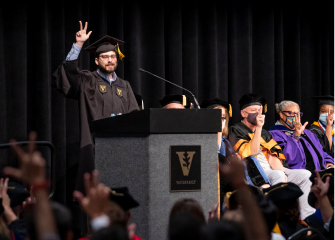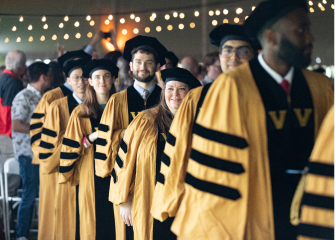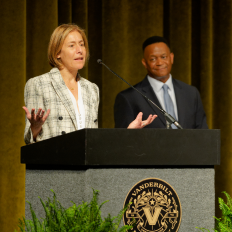Master's Cost of Attendance
 For Master’s programs offered through the Graduate School, you can find information on tuition per credit hour, student health insurance and additional student fees in this cost of attendance guide.
For Master’s programs offered through the Graduate School, you can find information on tuition per credit hour, student health insurance and additional student fees in this cost of attendance guide.
In some instances, students admitted to terminal master's degree programs in the Graduate School are offered financial aid and awards, but not as frequently or to the same extent as are Ph.D. students. Other opportunities for financial assistance may be found through varied work positions on campus, some of which are research and administrative assistantships.
Additional details regarding student financial packages may be obtained from your academic department or program. All Graduate School students are eligible for additional funding during the progression of your studies.
M.F.A. Degree Funding
 Master's of Fine Arts (M.F.A.) students can generally expect funding packages that include teaching/research assistantships that pay tuition (approximately $43,000/year), medical insurance ($3,975), student fees and a supplemental income stipend ranging from $34,000 to $39,000 per year for five years (depending on the department).* Learn more about M.F.A. funding opportunities.
Master's of Fine Arts (M.F.A.) students can generally expect funding packages that include teaching/research assistantships that pay tuition (approximately $43,000/year), medical insurance ($3,975), student fees and a supplemental income stipend ranging from $34,000 to $39,000 per year for five years (depending on the department).* Learn more about M.F.A. funding opportunities.
*Data updated February 29, 2024; stipend range excludes School of Nursing given that it is an online program.
Doctoral (Ph.D.) Funding
 Vanderbilt University provides awards, stipends, fellowship and assistantship funds to attract the best and brightest doctoral students. Financial awards are available in several forms, with considerable variation from one program to another.
Vanderbilt University provides awards, stipends, fellowship and assistantship funds to attract the best and brightest doctoral students. Financial awards are available in several forms, with considerable variation from one program to another.
As a doctoral student, research and/or teaching will be a vital part of your graduate training. Since the Ph.D. is primarily a research degree, our doctoral students are expected to be engaged in research throughout their graduate careers. This research is typically carried out under the mentorship of one of our esteemed faculty members and will result in the student’s Ph.D. dissertation. Teaching experience is an important part of your intellectual development and professional preparation. Varying by discipline, some of our graduate programs provide two semesters of teaching experience for our Ph.D. students (as a Teaching Assistant or similar role). Collectively, your teaching and/or research experiences form the basis of your funding package.
Ph.D. students can generally expect funding packages that include teaching/research assistantships that pay tuition (approximately $43,000/year), medical insurance ($3,975), student fees, and a supplemental income stipend ranging from $34,000 to $38,000 per year for five years (depending on the department)*. PhD students are also eligible for the Launching Student Success Stipend.
*Data updated February 29, 2024; stipend range excludes School of Nursing given that it is an online program.
University Scholarships
University Tuition Scholarships are service-free awards that pay all or part of tuition costs. The maximum award value is currently $27,372 for the academic year. There are many university scholarships available to doctoral students. Often, master’s students are eligible depending on certain criteria and their program of choice.
The following awards are normally supplemented by a full University Tuition Scholarship, which usually includes student health insurance coverage: University Fellowships, Graduate Teaching Assistantships, Graduate Research Assistantships, Traineeships, and Teacher Training Awards.
At Vanderbilt, we recognize that nurturing student scholarship is not merely about providing resources; it's about cultivating an environment where innovation and creativity are encouraged and ensuring every student has the opportunity to contribute meaningfully to their respective field.
Enhanced Funding Model
 In the Spring of 2021, Provost Cybele Raver announced a new $5 million annual
In the Spring of 2021, Provost Cybele Raver announced a new $5 million annual
investment in graduate education to show Vanderbilt’s commitment to training and mentoring the next generation of scholars and thought leaders. As part of this enhanced funding model, graduate students will be able to take advantage of:
- Financial enhancements to assist with additional non-tuition related costs
- Support, funding and external grant and workshop opportunities
- Graduate community enhancements
- Partnerships to support graduate students
Learn more about the Enhanced Funding and Support Model for Doctoral Education.
